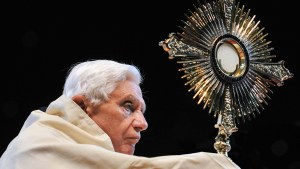The National Eucharistic Pilgrimage is well on its way, as pilgrims have completed the first week of their two-month journey. The pilgrimage is taking place on four different routes that form the pattern of a cross over the entire country and conclude in Indianapolis for the 10th National Eucharistic Congress on July 16.
The Pilgrimage and Congress are the culmination of the USCCB’s efforts to spark a National Eucharistic Revival in the US, which have been ongoing since 2022. The five-day Congress in Indianapolis, where much of the festivities will take place at Lucas Oil Stadium, will precede the final year of the National Eucharistic Revival: The Year of Mission. This will coincide with the 2025 Year of Jubilee and will continue until Pentecost.
In an effort to share the progress of the Eucharistic pilgrims, the National Eucharistic Revival is holding weekly press conferences with representatives from each of the four routes.
The first week unfortunately took place without a representative from the Southern Juan Diego Route, but Jack Krebs (Serra Route), Natalie Garza (Seton Route), and Matthew Heidenreich (Marian Route) were still on hand with heartwarming testimonials.

Each of them described large crowds attending the first steps of their pilgrimage routes, with the Northern Marian Route and Western Serra Route drawing thousands to see them off.
While not all who start the pilgrimage will walk the entire journey, Garza noted that the Eastern Seton Route drew in many who pledged to walk the entire route. Although they had been on the road for a few days, each of these young pilgrims was beaming with enthusiasm and joy over their work.
I thought I missed Jesus …
While walking with Jesus obviously brought them joy, they seemed just as pleased with their interactions with others they met along the way. Heidenreich told a story from the first day of the pilgrimage, when around 1,700 people walked in procession from a Mass. There were so many people that many could not see the monstrance at the lead.
Later in the day, in a more private procession of just the chaplains and pilgrims, they passed a pair of cyclists, a mother and daughter. They reverently left their bikes and knelt while the procession passed, but when one of the pilgrims stopped to ask them what they thought of running into Jesus on the trail, the daughter broke down in tears. They explained that they had been in the larger procession, but could not see the monstrance. The girl was so moved, because she felt like she had missed Jesus, and now Jesus had come to her.

One of the best stories from the beginning days of the pilgrimage came from the Marian Route.
Garza explained that the pilgrims had just arrived in Bridgeport, Connecticut, by boat when a young boy on a bicycle saw them and began to follow along, kneeling when the pilgrims knelt, praying when they prayed, and walking with them through the city.
Once the procession had walked about a mile through Bridgeport, the boy turned to a priest and asked if they were going back to the port. When the priest explained that they weren’t turning around until Indianapolis, the boy exclaimed, “Oh no, my parents are going to be so mad!”
Thankfully, the boy was able to get escorted back by police officers, although there was no news as to how mad his parents were! Garza said that the story stuck out in her mind because of the young boy’s innocent faith:
“It was a beautiful moment of just this childlike wonder and faith and seeing something beautiful, hearing about Jesus, and dropping everything and following Him. So it’s a great moment and witness of faith in what we ought to be doing every single day.”
Aleteia will bring more stories from the National Eucharistic Pilgrimage each week, but the interviews with these young pilgrims can be heard in their entirety at the website of the National Eucharistic Revival.




